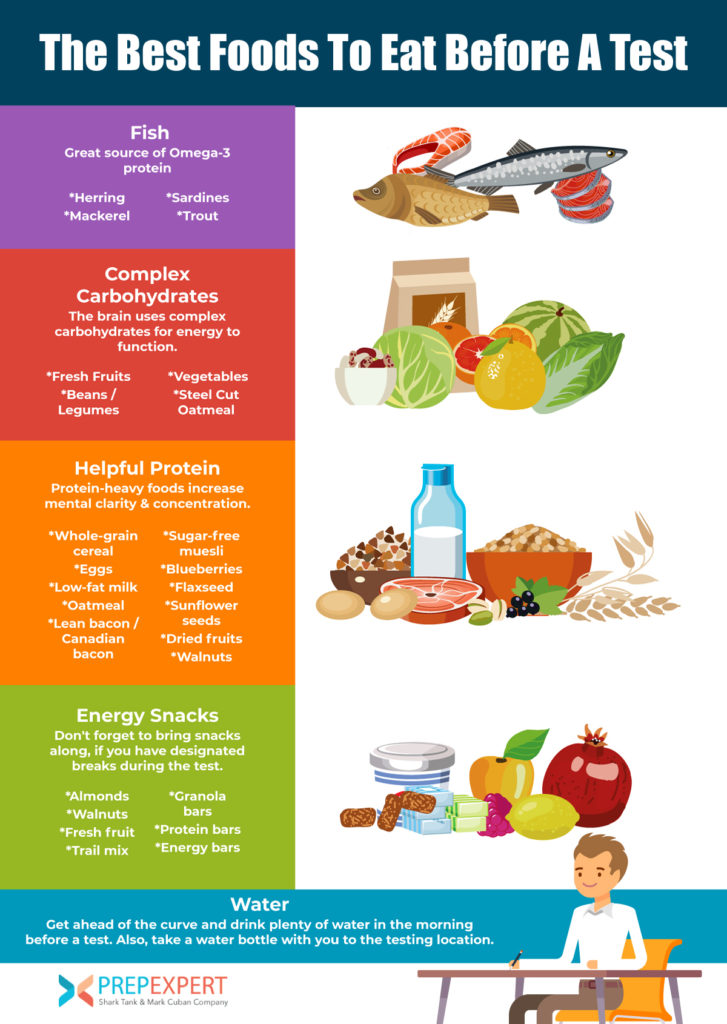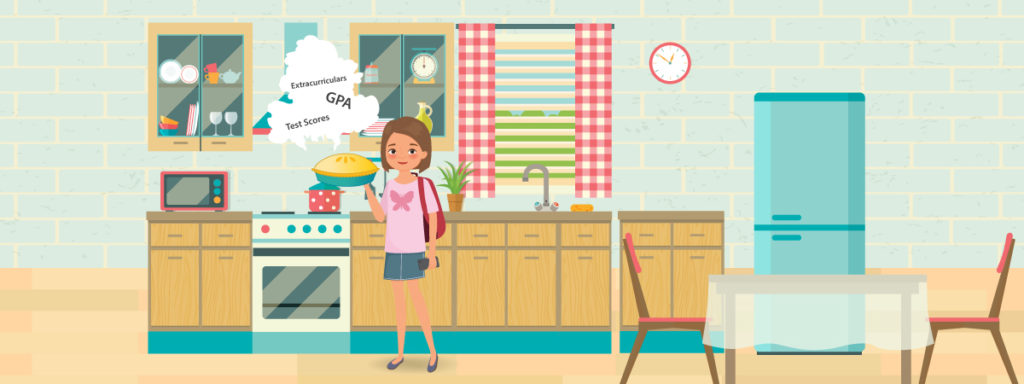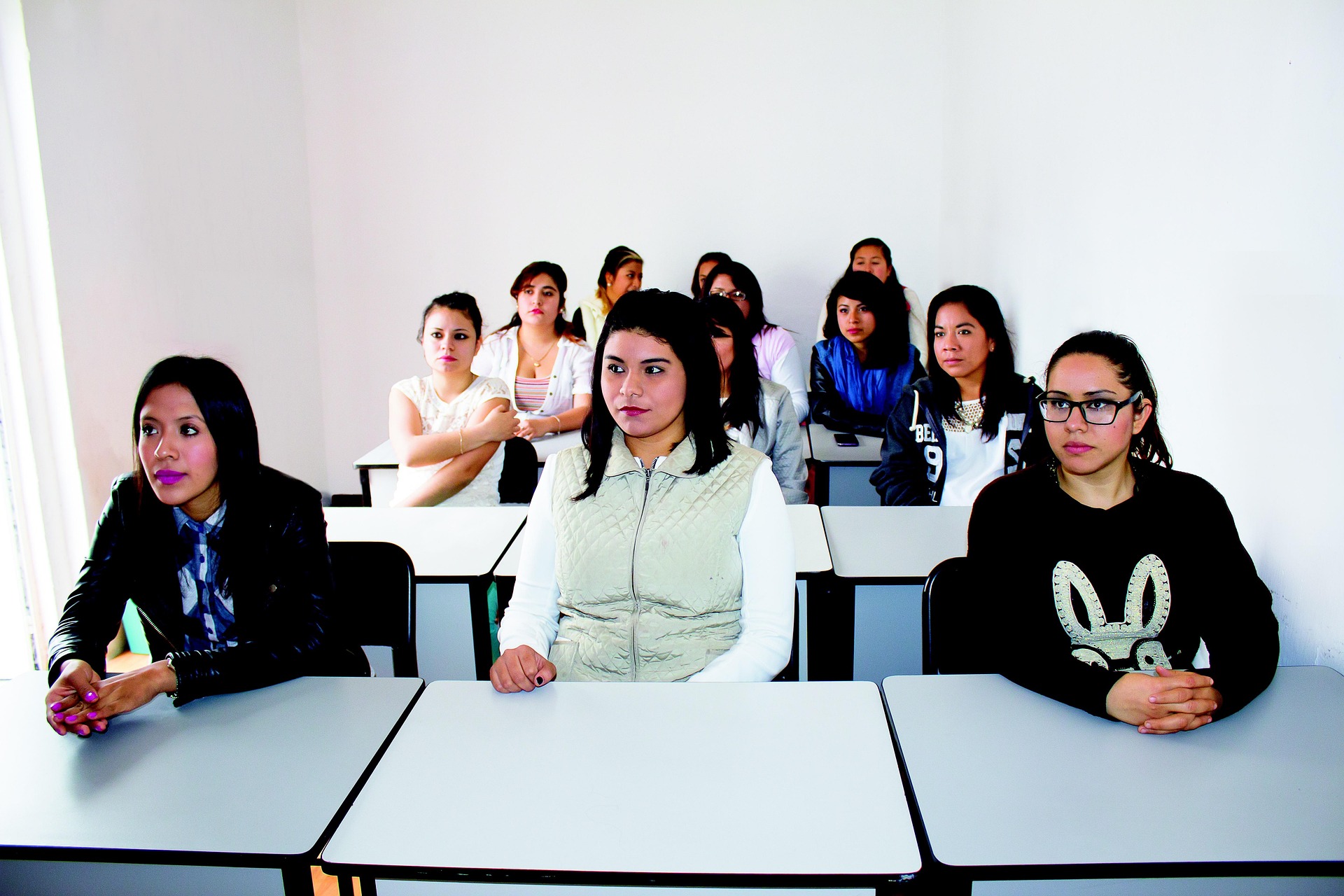The Best Foods To Eat Before A Test

Diet is important when it comes to learning. Besides knowledge, you do need actual “brain food” to keep the mind sharp, improve your attention span, and be cognitively flexible.
When it’s time for you to take the SAT, the foods you eat that morning and the night before can make a big difference as you’re testing.
While you’ll also want to spend months studying and know critical SAT test day tips before entering the testing center, you shouldn’t downplay the influence that proper nutrition can have on your score.
Let’s take a look at the best foods to eat before a test, so you know what to have for dinner and breakfast to get ready.

The best foods to eat before a test
Clocking in at 2 hours and 14 minutes, the SAT is a strenuous test that can wear you down by the end of it.
Eating a combination of the types of foods listed before will make sure you have the energy, focus, and brain function necessary to answer all 154 questions on the SAT:
Fish
The night before the SAT, it may be helpful to eat some salmon.
Fish can be a great source of Omega-3 fatty acids, a type of protein that is great for boosting brain functionality, helping you stay alert and concentrate more easily.
However, not all fish are created equal.
The best fish to get Omega-3s from are cold-water fish. Wild Alaskan salmon is the absolute best source, and a great dinner too.
Other fish worth eating include:
- Herring
- Mackerel
- Sardines
- Trout
Each of these types of fish contains Omega-3s, making them a good choice for a meal the night before taking a test.
If you’re adventurous, you can take some sardines with you for a snack. However, it’s important for you to remember that you can only eat this fish, and any other snacks, in designated areas during breaks on the test.
Complex carbohydrates
If you follow many diets today, they hound about the importance of avoiding carbohydrates.
However, as much as people try to stay away from carbs to prevent weight gain, they provide benefits that will be usful on test day.
Here’s why. Your brain is like an engine. It needs fuel to properly function. The main fuel it uses is sugar.
Not all sugars are the same. Simple sugar, like what’s in candy and soda, burns up fast and doesn’t provide consistent energy. While it might be tempting to drink a can of soda or an energy drink to give you a boost before you take the test, this will inevitably lead to a crash, and you will find yourself lacking energy as the test goes on.
Complex carbohydrates provide more energy and are healthier than simple sugars. Because they take longer to digest, they send a steady stream of sugar into your bloodstream, giving you hours more energy than you would gain from simple sugars.
On the morning of the SAT, make sure to eat some foods that serve as complex carbohydrates.
There are plenty of options to choose from:
- Fresh Fruits
- Vegetables
- Beans / Legumes
- Steel Cut Oatmeal
- Whole wheat bread
Pairing some of these options together into a healthy breakfast before a test helps. For breakfast on test day, try making a bowl of oatmeal topped with fresh blueberries, a piece of whole wheat toast topped with avocado, or a smoothie with a blend of fruits and vegetables.

Protein
Protein is your best friend before a test. Protein is responsible for kicking off some of the processes your body needs to create enzymes, fuel energy, and transport oxygen throughout your body.
Furthermore, protein-heavy foods contribute to increased concentration and mental clarity.
Eating a healthy, protein-packed dinner the night before, or breakfast the morning of, a test will help tremendously.
Great breakfast choices include:
- Whole-grain cereal
- Eggs
- Low-fat milk
- Oatmeal
- Lean bacon / Canadian bacon
- Sugar-free muesli
Protein-rich snack foods include:
- Blueberries
- Flaxseed
- Sunflower seeds
- Dried fruits
- Walnuts
For dinner, fish paired with any of the following protein-heavy vegetables help too:
- Asparagus
- Brussels sprouts
- Bell peppers
- Raw carrots
- Broccoli
- Spinach
There’s plenty of room for delicious and helpful protein meals before tests.
Water
While water is not technically a food, we’ve included it here because you don’t ever want to underestimate the importance of drinking water, especially before a big test.
Water is essential for a healthy body and mind. Just like the rest of your body, the brain needs consistent hydration in order to perform.
Get ahead of the curve and drink plenty of water the night and morning before a test. Also, take a water bottle with you to the testing location. On a break, don’t be afraid to drink a bit.
Don’t wait until you feel overly fatigued to drink. That symptom means dehydration has kicked in. Dehydration itself can:
- Diminish concentration
- Cause feelings of faintness
- Drain physical energy
Make sure you are monitoring your water intake and staying hydrated throughout your test.

Energy boosting snacks to eat during the test
When you take the SAT, you will have time to snack during designated break times in designated areas.
Take advantage of these breaks and bring food that keeps your energy up. Again, focus on complex carbohydrates and protein.
Great choices to bring include:
- Almonds
- Walnuts
- Fresh fruit
- Dried fruit
- Sunflower seeds
- Trail mix
- String cheese
- Granola bars
- Protein bars
While they might seem like a good way to gain energy quickly, it’s best if you don’t bring:
- Chocolate
- Candy
- Soda
- Energy drinks
These foods all contain simple sugars that will cause crashes. Remember, if you do bring snacks, make sure to only eat them during breaks. If you try to eat during the test, the proctor will make you put your snacks away.
Nutrition Tips for Test Day
Here are some tips to help you round out your test day eating habits.
1. Eat a Balanced Breakfast
Choose a breakfast that includes complex carbohydrates, protein, and healthy fats to provide sustained energy throughout the test. Good options include whole grain toast with peanut butter, yogurt with fruit and granola, or eggs with vegetables.
If you’re not normally in the habit of eating breakfast, try waking up earlier to eat breakfast in the days leading up to the exam. You don’t want to throw your body out of its regular routine by suddenly doing something you’re not used to doing on test day. You can also aim for a lighter breakfast or a snack in place of a full balanced breakfast if necessary.
2. Avoid Notoriously Heavy or Greasy Foods
Stay away from foods that may cause digestive discomfort or sluggishness, such as heavy breakfast sandwiches or greasy fast food. These can make you feel lethargic and unfocused during the test. They may also bring about an early crash compared to healthier, fresher foods like fruits or granola.
3. Plan Ahead
Plan what you’ll eat for breakfast and snacks the day of your test beforehand. Don’t wait until that morning to grab something random. You might not know how your body will react to whatever you choose to eat unless you choose something you know agrees with you.
4. Stay Hydrated
Drink plenty of water before the test and during your breaks to stay hydrated and keep your brain performing at its best. Dehydration can negatively impact both your concentration and alertness.
The College Board permits you to bring a drink and snacks, so don’t be afraid to bring your refillable water bottle. Most testing locations will probably have an area where you can fill your bottle back up if you happen to run out.
Other useful items you can bring on test day include:
- A watch without an audible alarm.
- A charging cable or portable charger.
- A bag or backpack.
- A backup testing device.
5. Avoid Caffeine Overload
While caffeine can provide a temporary energy boost, consuming too much can lead to jitters and anxiety. This is especially unhelpful for students who already suffer from even a moderate amount of test anxiety. If you choose to have caffeine, do so in moderation and consider opting for green tea or black coffee instead of sugary energy drinks.
Students who normally drink caffeine in the mornings can still drink their normal amount before the test. However, students who don’t usually drink it should stay away. It could interrupt your usual routine and make you feel sick, jittery, or even more tired.
6. Eat Well the Night Before
Believe it or not, the food you eat the night before an exam can also have an effect on your test day performance. Fuel up with a balanced dinner as well, including protein, greens, and complex carbohydrates.
However, make sure you don’t eat too close to bedtime. This can make it more difficult for you to get a good night’s sleep. Experts recommend that most people stop eating around 3 hours before sleeping so they have enough time to digest without getting hungry again.
Common reasons why students eat poorly before tests
Although there are clearly many benefits to eating foods with complex carbohydrates and protein, countless students do not eat well before they take the SAT.
This is usually for one of two main reasons:
Time
The SAT starts at 8:00 sharp. Because it starts so early, many students feel like they do not have enough time as they rush around in the morning to eat a good breakfast.
If you’re worried about how you are going to make time to eat a helpful breakfast before the test, consider prepping your breakfast the night before.
Here are a couple of quick and easy recipes for foods that you can prep the night before your test so that you can have breakfast ready in a jiffy when you wake up:
- Overnight oatmeal
- Egg casserole
- Breakfast sandwiches
- Oatmeal breakfast bars
- Fruit and yogurt parfait
- Freezer smoothie packs
Nerves
Another reason why some students neglect to eat well before they take the SAT is because they are nervous.
The SAT is an important test. Earning a good score can unlock countless opportunities that will lead to academic and career success.
As such, it is normal to feel nervous on the morning of the test. Unfortunately, for many students, these nerves keep them from wanting to eat anything, so they skip breakfast on test day.
I can not overstate how important it is to avoid skipping breakfast on test day. Without any source of energy, you will have a hard time making it through the entirety of the test with sharp focus and concentration.
The best way to combat these nerves so that you feel like your stomach can handle some breakfast on the morning of the test is to make sure you are well-prepared.
Many times, nerves come from students not knowing what to expect or feeling anxious about how well they will do on the test.
If you have spent months studying for the SAT, taking practice tests, working with a private tutor, and learning from an SAT prep course, you won’t be nearly as nervous when it’s time for you to take the test.
For more test strategy, college admissions, and scholarship application tips, sign up for a Prep Expert SAT prep course right now!
BEST FOODS TO EAT BEFORE A TEST FAQ
WHAT KINDS OF FISH ARE GOOD TO EAT AND WHY?
Fish are a great source of Omega-3 protein, which is great for boosting brain functionality, making you alert and concentrate more easily. Great fish to eat include wild Alaskan salmon, herring, trout, mackerel and sardines.
IS IT OKAY TO EAT CARBOHYDRATES BEFORE A TEST?
Yes, as long as they are complex carbohydrates and not simple sugars like soda and candy. Complex carbs that will help include fresh fruits, vegetables, and steel-cut oatmeal.
WHICH PROTEINS SHOULD I EAT BEFORE A TEST?
Whole-grain cereal, Eggs, Low-fat milk, Oatmeal, Lean bacon or Canadian bacon and Sugar-free muesli are all great breakfast choices with plenty of protein.
ARE THERE ANY HELPFUL SNACKS I CAN EAT?
Almonds, Walnuts, Fresh Fruit, Trail mix, granola bars, protein bars, and Energy bars are great snack choices to take with you on test day.
Written by Dr. Shaan Patel MD MBA
Prep Expert Founder & CEO
Shark Tank Winner, Perfect SAT Scorer, Dermatologist, & #1 Bestselling AuthorMore from Dr. Shaan Patel MD MBA

What Kind of SAT Score Gives You a Good Chance at a Scholarship in 2026?
As more colleges remain test optional, students often assume standardized test scores no longer matter for scholarships– but that’s a…

ACT Scores and Scholarships: Where To Look and What To Know
In the USA, outstanding student loan debt totals almost $145 billion. To put that in perspective, if American student loan…

From Test Anxiety to “I’ve Got This”: How Prep Expert® Students Build Real Confidence Before SAT & ACT Day
Confidence is one of the most underrated score boosters on the SAT, PSAT, and ACT. Students can know the content…